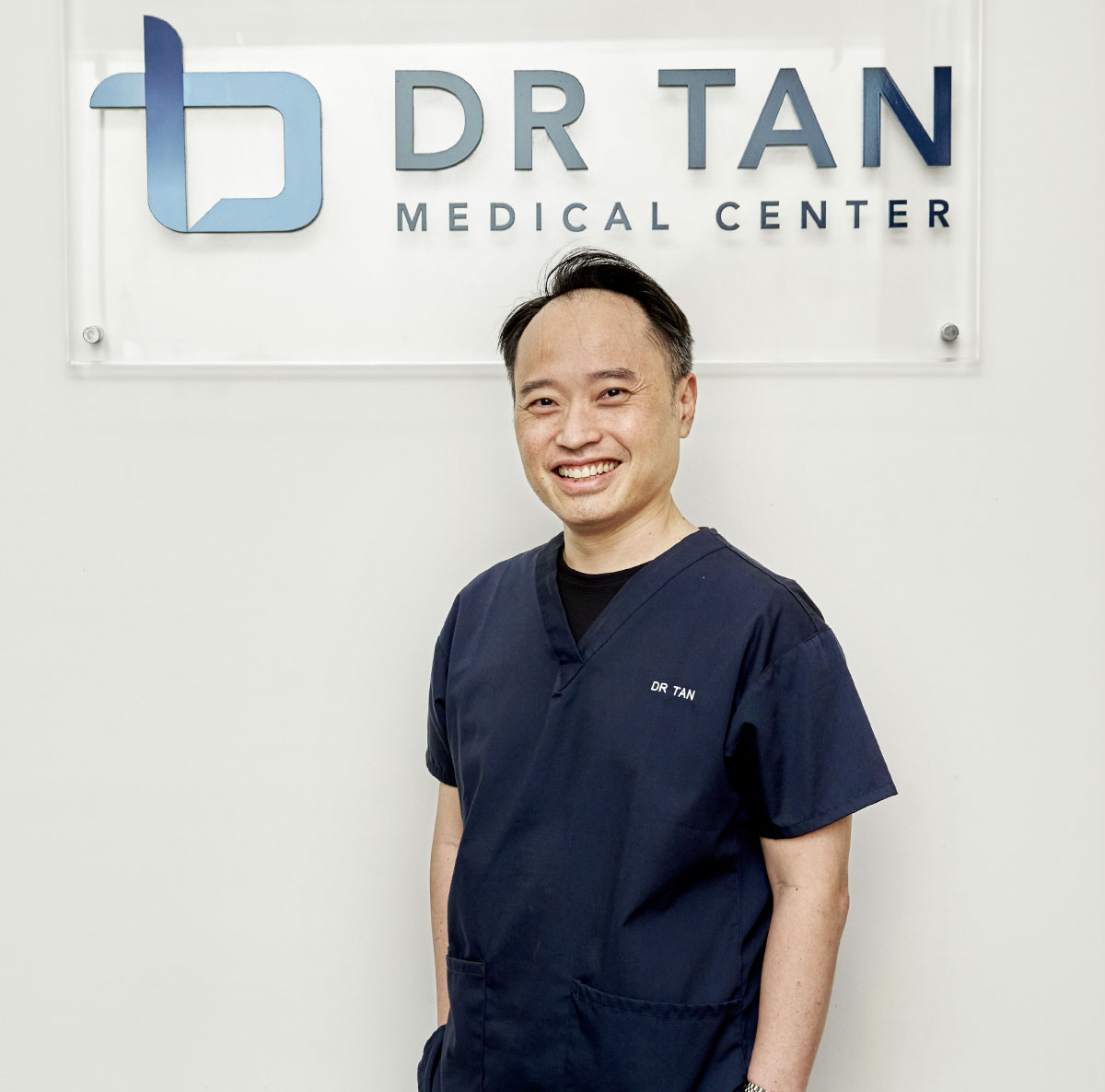STD (STI) Treatment in Singapore

Dr Tan Kok Kuan
Men’s Health & Sexual Health Doctor
MBBS (S’pore), Cert. Men’s Health, Cert. Clinical Dermatology,Member, Academy for Men’s Health (Singapore)Member, Singapore Association for the Study of ObesityMember, International Society of Sexual Medicine
What Is an STD (STI)?
A sexually transmitted disease (STD), or sexually transmitted infection (STI), is a highly contagious infection that is passed from person to person via sexual contact, such as oral, vaginal and anal sex. Some infections, like HPV (human papillomavirus) and herpes, can also be transmitted via skin-to-skin contact. Others are transmitted through infected blood and fluids from blood transfusion, sharing of needles, sometimes even during pregnancy and breastfeeding.
STDs can be painful, unsightly and even result in long-term health issues if left untreated, but thankfully, most are easily treated if promptly detected through regular STD screening in Singapore.
What Causes STDs (STIs)?
STDs are caused by a bacterial or viral infection that is transmitted via sexual or intimate contact. The following activities can increase one’s risk of catching an STD:
Having unprotected sex
Having multiple sexual partners
Not wearing a condom or improperly using a condom
Frequently engaging in one-night stands or enlisting paid sexual services
Sharing needles or syringes
Drug or alcohol abuse that impairs judgment, leading to risky sexual behaviour
Mother-to-infant transmission via pregnancy, childbirth and breastfeeding
As there are many different diseases that can be transmitted via sexual contact, we provide individualised advice on STD testing based on each patient’s unique situation.
What Are the Symptoms of an STD (STI)?
The symptoms of an STD will depend on the type of infection and its severity. The most common symptoms include:
Unusual or foul-smelling discharge from the vagina or penis
Abnormal bleeding from the vagina
Redness and itching in the genitals
Sores, warts, rashes, ulcers and blisters in the genital, rectal or mouth area
Burning sensation during urination or painful urination
Painful intercourse
Lower abdominal pain
Fever and chills
Swollen lymph nodes
Some STDs do not present with any symptoms, making them more dangerous and increasing their chances of being passed to others.
To protect yourself and others, get tested at your STD screening clinic in Singapore.
Book an STD Screening TodayIncubation and Infectious Periods of STDs (STIs)
The incubation period of an STD/STI refers to the time between exposure to the infection and the appearance of symptoms. This period can range from a few days to several weeks or even months, depending on the type of infection and how quickly the body reacts—either through symptoms or the development of detectable markers like antibodies.
The infectious period, on the other hand, is the timeframe during which an infected person can transmit the infection to others. This period may overlap with the incubation period, especially in asymptomatic cases where individuals feel well but can still spread the disease.
As reported by the National Centre for Infectious Diseases (NCID) in Singapore, the average incubation and infectious periods for each common STDs/STIs are as follows:
Incubation Period
- Chlamydia: Typically manifests within 5–14 days
- Gonorrhoea: Usually appears within 3–5 days
- Ano-genital Herpes: Symptoms develop within 2–14 days
- Ano-genital Warts: May take 1–6 months to become visible (average: 3 months)
- Syphilis: Presents within 10–90 days (average: 21 days)
- Trichomoniasis: Generally appears within several days
- HIV: Acute infection typically occurs within a month. Without treatment, progression to AIDS may take about 5–8 years.
Infectious Period
- Chlamydia and Gonorrhoea: They are transmissible throughout active infection, whether symptomatic or asymptomatic.
- Ano-genital Herpes: The highest transmission risk is during active vesicles and erosions. It can spread during asymptomatic periods. Viral shedding is also an important transmission route.
- Ano-genital Warts: Transmission risk increases during active lesions. Subclinical infections are common and can transmit the virus.
- Syphilis: Most infectious during the primary and secondary disease stages
- Trichomoniasis: Transmissible throughout active infection, with or without symptoms
- HIV: Infectious from early infection stages until demise if untreated
What Is an STD Test / STD (STI) Screening?
STD screening in Singapore is a medical examination that checks for the presence of sexually transmitted diseases (STDs). This usually involves urine tests, blood tests, and physical examinations.
What Are the Treatments for STD (STI)?
We give comprehensive advice on STD treatments required, as well as expedited partner therapy and close follow-ups to ensure eradication of the infection.
Not all STDs manifest with symptoms. Very often, STDs are only detected via screening. If a patient has been diagnosed, there are several considerations:
Treatment of current infection
– The actual treatment required depends on the particular STD diagnosed. Most of the time, the STD treatment in Singapore will be in the form of tablets and/or injections.Ensuring that the infection has been eradicated
– Commonly known as a “test of cure”, this is performed after a specified time to ensure that the infection has been completely cleared from the body.Preventing or minimising recurrences
– Some STDs such as Herpes, HPV warts, Syphilis and Hepatitis B are known to be recurring. As such, it is important that strategies be taken to prevent the rate of recurrence.Partner testing and therapy
– Testing and treating sexual partners is a key component of managing an STD infection. This breaks the chain of infection and re-infection due to exposure to the same partner.Preventing or minimising the risk of re-infection
– Strategies to minimise the risk of re-infection include the correct and consistent use of condoms, vaccination and tablets taken before or after high-risk exposures that can minimise the risk of certain STDs and also HIV.
If you've been diagnosed with an STD or have concerns about your symptoms, timely and appropriate treatment makes all the difference.
Our team provides discreet, evidence-based care tailored to your needs.
Book a ConsultationHow To Prevent STDs (STIs)
Taking proactive measures in sexual wellness is vital to one's overall health. While refraining from all sexual activities (abstinence) is the only method that fully eliminates the risk of STDs or STIs, it may not be a feasible option for sexually active individuals or those planning to enter into new relationships.
Fortunately, several methods can help reduce the risk of acquiring STDs while promoting safe sexual practices. These include:
- Use of Barrier Contraceptives – Consistent and correct use of barrier methods, such as male or female condoms and dental dams, during vaginal, anal, or oral sex can significantly reduce the risk of transmission. While these methods do not offer complete protection, they are highly effective compared to unprotected sex, which remains the most common mode of STI transmission.
- Regular Testing – Many STDs/STIs often have no symptoms, especially in the early stages. Regular testing is crucial, particularly for sexually active individuals or those with multiple partners. Early detection helps prevent complications and reduces the risk of unknowingly spreading an infection.
- Vaccinations – Some STIs are preventable through vaccination, including human papillomavirus (HPV) and hepatitis B. The HPV vaccine protects against certain strains that can cause genital warts and various cancers, including cervical, anal, penile, and oropharyngeal cancers.
- Avoiding Risky Behaviours – Limiting the number of sexual partners and avoiding casual sex can mitigate STI risks. Additionally, limiting alcohol consumption before or during sex can help reduce impaired judgment and risky sexual behavior.
- Staying Educated – Staying informed about STDs, their transmission, and prevention helps promote responsible sexual decisions. Healthcare professionals can offer guidance, support, and resources tailored to individual needs.
Frequently Asked Questions About STD (STI)
What are the most common STDs (STIs) in Singapore?
Which types of STDs (STIs) can be cured?
How common are STDs (STIs) in Singapore?
Helpful Links
Read Dr Tan’s “Consensus Statement on HPV Vaccination for Men in Singapore”
https://cfps.org.sg/publications/the-singapore-family-physician/article/2117_pdfRead on the myths and facts about STIs from the Department of STI Control’s website
https://www.nsc.com.sg/dsc/prevention-education/sexually-transmitted-infection/Pages/Myths-and-Facts-about-STIs.aspxRead more on STIs at Health Hub’s website
https://www.healthhub.sg/programmes/sexually-transmitted-infections
STD (STI) Doctor in Singapore

STD (STI) Doctor in Singapore
Dr Tan Kok Kuan
Men’s Health & Sexual Health Doctor
MBBS (S’pore), Cert. Men’s Health, Cert. Clinical Dermatology,Member, Academy for Men’s Health (Singapore)Member, Singapore Association for the Study of ObesityMember, International Society of Sexual Medicine
Dr Tan Kok Kuan is an experienced doctor specialising in men's health, sexual health and medical weight loss. With over 20 years of clinical experience, he offers confidential and effective screening and treatment services. Notably, Dr Tan was one of the key authors of Singapore’s National HIV PrEP Guidelines and the national blueprint to end HIV transmission by 2030. Dr Tan frequently speaks at local and international conferences and has been featured in the media, where he helps raise public awareness around men’s health and sexual health.
“Every patient deserves our fullest attention.”
If you have any queries, please contact us at 6513 0359 or use the contact form below.

10 Sinaran Drive #09-30, Novena Medical Centre, Singapore 307506
Tel: (+65) 6513 0359 | WhatsApp: (+65) 9750 5037
Operating Hours:
Monday to Friday: 8:30 AM to 6:30 PM
Saturday: 9:00 AM to 2:00 PM
Closed on Sundays and Public Holidays

